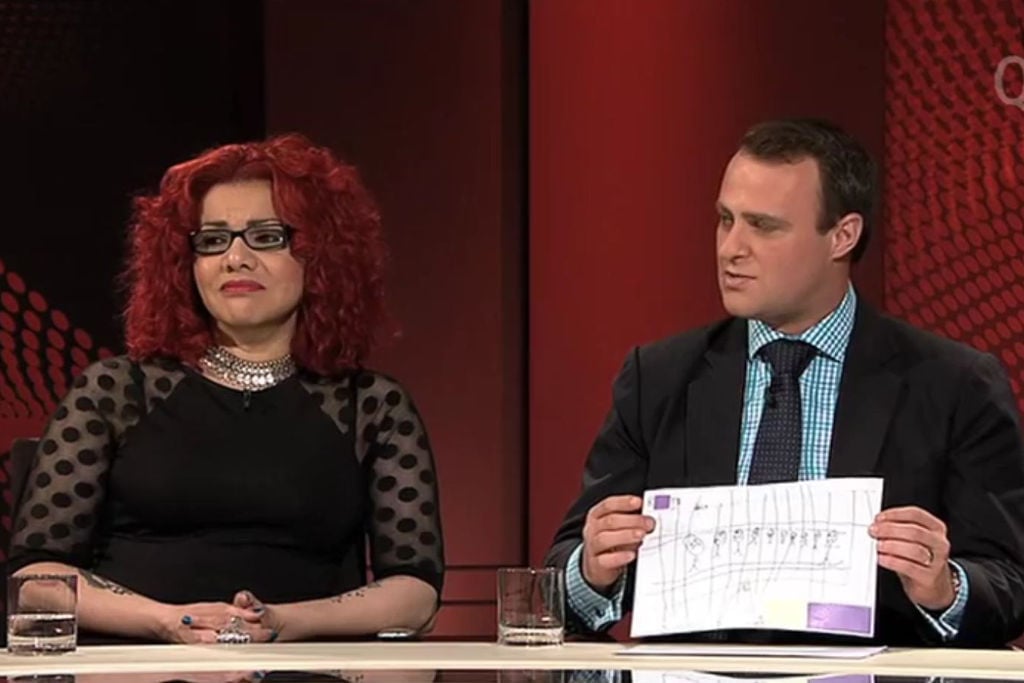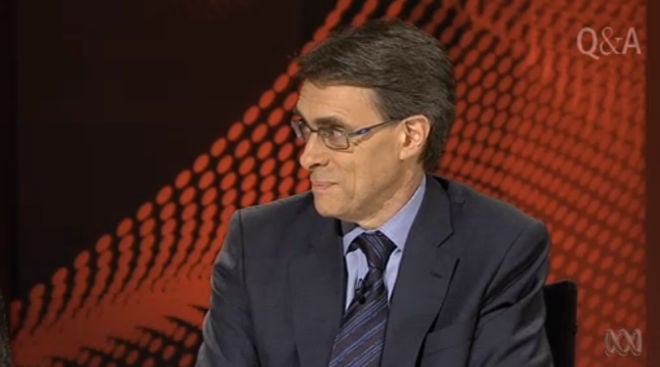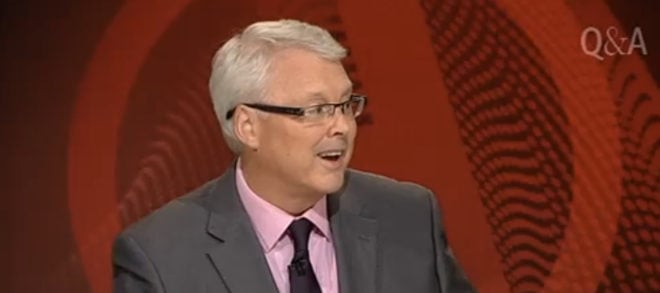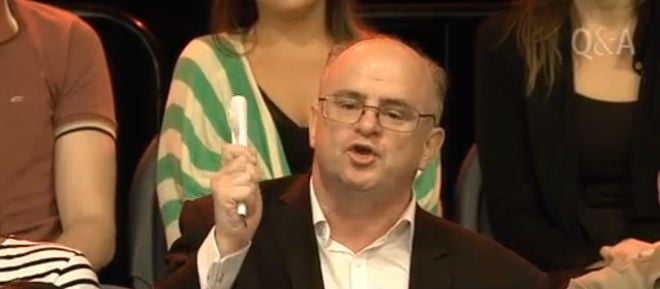The Seven Most Embarrassing Things That Happened On Monday Night’s Q&A
"Australia is looking quite ridiculous to the rest of the world," says the rest of the world.

This week’s show was always going to be a fun one.
Four human rights and environmental activists from vastly different backgrounds, sitting alongside Australia’s own Human Rights Commissioner: a classical liberal and conservative who has so far had little to say about human rights atrocities that don’t relate to freedom of speech.
Over the weekend, Wilson came out largely in support of the controversial, Andrew Bolt-inspired changes to 18C of the Racial Discrimination Act, which will effectively make it legal to “offend, insult, humiliate” people based on their race or ethnicity, but unlawful to “vilify” them. He also told Fairfax that he thought it was “bizarre” that some people were allowed to use the the n-word while others weren’t.
I’d be more sympathetic to these freedomlovers if they treated hate speech like an unfortunate side-effect of free speech rather than a perk
— Ben Jenkins (@bencjenkins) March 30, 2014
Sharing a panel with Wilson was Egyptian commentator, activist and feminist Mona Eltahawy; Somalian founder of the Elman Peace and Human Rights Centre, Ilwad Elman; and UK ethics journalist and environmentalist Lucy Siegle, all in Australia for the Sydney Opera House’s All About Women event which was held on Sunday. Also on the panel was Kenneth Roth, who has been executive director of Human Rights Watch since 1993.
Let’s watch what happens next.
–
The Whole Knights/Dames Thing Is A Bit Of A Joke
After being asked the first question — ‘Does the return of knights and dames really have a place in modern Australia?’ — Lucy Siegle pointed out that it’s a fraught system in the UK, which a government would be silly to enter into willingly. The panel was united on this one: it was “odd”, “a step back”, and “a distraction from more important things”: “It seems Australia’s regressing a little bit.” Even Tim Wilson would have preferred a home-grown system that recognised Australia’s indigenous heritage, and could be used as an opportunity to bring about cultural change.
Tony Jones asked Kenneth Roth if he was surprised that Australia would “return to such an anachronistic form of honours?”
“It’s sadly characteristic of this Government, no?” Roth replied.
And then he pulled this face, and the audience went “Ooooooooh.”
Mona Eltahawy called it “ludicrous”, and asked to be addressed as Sir Mona Eltahawy henceforth.
“I come from a country that was under British occupation for so many years, and when we got rid of the Brits finally in 1952, and they asked us if we wanted to join the Commonwealth, we said, ‘Fuck no’. You still have the Queen on your money! … It’s utterly bizarre.”
She continued to swear freely and magnificently throughout the program.
Take this as a retrospective language warning. #qanda #livetelevision
— Mark Scott (@mscott) March 31, 2014
–
Nobody Agrees With Tim Wilson On Free Speech
While Tim Wilson wasn’t ready to commit wholeheartedly to the wording of the proposed changes to 18C (“I’m still waiting on my legal advice”), he distanced himself from the quotes published in Fairfax over the weekend. “I never said that it was the case that people should be able to use those terms,” he said. “I was explaining to a journalist that there was a difference between social convention and law, and making a very clear case that we should have equality before the law.”
What he failed to acknowledge was that, while a sound philosophy on paper, formal equality before the law doesn’t work without substantive equality, in which the law and society protects everyone equally, too. Which, of course, doesn’t happen here.
#qanda There is already equality before the law, Tim Wilson, but entrenched inequality in society. Changing #18c widens that inequality.
— Full Point (@subdoylo) March 31, 2014
Our human rights commissioner fails to understand the difference between formal equality and substantive equality in law- how awful #QandA
— James Haddock (@MontyHaddock) March 31, 2014
Mate, there is never such a thing as Equality Before The Law. Especially if you are an Indigenous Australian. #qanda
— RedheadEdition (@RedheadEdition) March 31, 2014
Both Mona and Ilwad were in favour of freedom of thought and freedom of expression, but freely expressed how dangerous it was to the minorities most often targeted by hate speech. “Who has freedom of expression, here,” Mona asked. “The rich people do. The powerful people do.”
“Bigotry destroys lives,” Lucy Siegel said. “So it is as important that there are laws to protect people from bigotry as there are in the other sorts of law and other sorts of cases that you mentioned … I think we’re looking at protecting the wrong people.”
Ken Roth wasn’t having a bar of it, either. “Let me begin with the Attorney General’s comment, because this is not a law professor; this is a public official … He should be setting social norms. This is a man who should not be running around saying, ‘You have a right to be a bigot’. He should be saying ‘Bigotry is wrong’. That’s what public officials should do.”
Just remember: Tony Abbott is paying Tim Wilson $300K a year to be this far out of his intellectual depth. #qanda
— Lady Rioting Peasant (@vanbadham) March 31, 2014
–
But Tim Wilson Did Make A Few Good Points
After making it clear that he thought the entire Knights/Dames thing to be fundamentally futile — “I don’t think Government should be issuing honours, generally” — Tim Wilson distanced himself from Tony Abbott’s backing of the Sri Lankan government. “My view is whenever Australia is siding up with only China and Iran, it’s probably not a good sign.”
“So do you think the Australian Government should have taken a different view on [Sri Lanka]?” Tony Jones clarified. “I think I’ve made that pretty clear,” Tim Wilson replied.
Also, he brought along a piece of paper to curry favour with the lefties in the room. And guess what? It worked.
–
The Q&A Audience Doesn’t Want To Hear About Any Other Countries, Thankyou Very Much
A lot of last night’s discussion focused on human rights abuses in Egypt, Somalia and Sri Lanka, favouring the voices of international experts over the echo chamber of Australian politicians that tends to take over the panel.
Many thought it was one of the finer panels the show has put together.
Many others didn’t.
Preferably I’d like #qanda to stick with Australian issues
— Lachie Gibson (@GibsonLachie) March 31, 2014
@qanda Enough already with biased Lefty UN panel of One World Government advocates. Australian issues Australian panelists please. #qanda
— ブラッド (@tomodachibrad) March 31, 2014
Has #qanda. Turned into foreign correspondent…. Get back to Australian issues.
— шiLLiαм (@URBANOMAD) March 31, 2014
I thought #qanda was about Australian issues
— Bobothejazzer (@bobothejazzer) March 31, 2014
I wonder if Egypt’s version of #QandA is discussing Australian issues…
— Alex Lucifero (@Alexander92DC) March 31, 2013
Can we have an episode with no mention of asylum seekers and other countries problems. #qanda
— Scientific Rantor (@sappenen) March 31, 2014
–
Here Is What Smart People Think Of Australia Right Now:
Kenneth Roth: “Australia is looking ridiculous to the world by being one of the only nations that is backing the Rajapaksa Government [in Sri Lanka], rather than doing everything it can to stop these atrocities and to bring to justice those who are responsible for the war crimes.
Ilwad Elman: “I think Australia’s taking a lot of horrific positions … They’re cuddling up with Sri Lanka, cutting off the boats, celebrating that they’ve had 100 days of no boats coming in, talking about how Australians [have the right to] be bigots? … It’s just showing a whole new Australia that I’ve never really thought about before, and I think a lot of people are going to be shocked by this new position and this movement.”
Lucy Siegle: “The positions that the Australian government is taking on behalf of the nation, they sound pretty toxic to outsiders.”
Mona Eltahawy: “Your main concern is to sell our regime’s and dictator’s weapons. You turn a blind eye to torture when you know very well what happens. You only pay attention when one of your subjects ends up in our jail — which is absolutely wrong, obviously I’m against the imprisonment of [Australian journalist] Peter Greste, but if he wasn’t in jail right now would you be paying any attention to the hundreds of thousands of people in Egyption jails? You wouldn’t! Whether it was the Australian government, the US government, the Europeans; all you care about is business deals, selling weapons to these dictators, getting all from them … None of you do absolutely anything to help us. You’ve ALWAYS sold us out. So: what’s new?”
It’s so humiliating that we have to have a foreigner appear on #qanda to tell us what’s going on in with our own country. Appalling. — Dame Sir Clementine (@clementine_ford) March 31, 2014
–
Here Is What This Guy Thinks Of Everything:
“The death at Manus Island was a tragedy,” said Andrew Wilson, from the audience. “People are obviously desperate when they’ve paid thousands to people smugglers and have no hope of coming here. Yet why did the ABC show no similar outrage for the thousands of deaths caused by the dismantling of The Pacific Solution?”
At this point, Andrew Wilson looked kind of normal. Nobody could have predicted what was coming.
Before fielding the question to Kenneth Roth, Tony Jones took issue with the claim. “I reject your characterisation of the ABC’s role in this; in fact, some of the most graphic reporting on this was done by ABC reporters, including finding ships that nobody even knew had been lost at sea.”
“Well I take issue with that you never once opposed a previous government’s policy,” Andrew Wilson said, not un-petulantly, “in my reading of the ABC.”
Tony Jones treated this ridiculous accusation with the expression it deserved.
Kenneth Roth answered the question: “The only reason they’re risking their lives is because there’s no alternatives. The countries around here don’t recognise refugee rights; none of them has ratified the Refugee Convention. That’s why they come to Australia; this is the first place in the region that does recognise those rights in principal, but it’s not respecting them now.”
“Part of the challenge to –” Tim Wilson began, before being interrupted by the questioner.
“So What Would Our Intake Have To Be, Do You Think, To Stop People From Fleeing From Afghanistan And The Hazara And So Forth? [sic]”
At this point, the questioner was looking a little less normal. He was speaking in sentence case and in italics, probably, and his lower lip was quivering.
Roth reminded him that, at this point, Australia is “nowhere near bearing its burden”. “The latest number was 20,000 asylum seekers who arrived by boat, I think in 2013. If my calculations are correct, that is roughly one tenth of one per cent of Australia’s population … Let’s compare that with Lebanon. Lebanon, a population of five million, has taken in one million Syrian refugees, with 1/7th the GDP per capita of Australia. Australia is pretending the sky is falling because 20,000 people arrived by boat? Let’s look at what a real disaster looks like.”
“Yeah but if you feel like that, why don’t you just put all your money into the UN refugee program?”
Roth was bewildered by this line of questioning. “I very much support the UN refugee program.”
“YEAH BUT ALL YOUR MONEY?!” interrobanged Andrew Wilson, to a man who had devoted his entire life to the protection of human rights.
Andrew Wilson wielded his rolled-up question as if it were an angry baton with a very pointy and accusatory end.
“Immigration’s been great for the country, and we can take a lot more immigrants, but you can’t take people to put them onto the dole,” this angry man seethed. “So we can’t run the same sort of welfare programs we have today unless we have the same immigration programs.”
“Well wait, wait, wait,” said Roth. “What is the assumption here? That because somebody seeks asylum they go on the dole? Please. Let me put this in perspective. My father was an asylum seeker, okay?”
“Yeah, yeah,” shrugged his interlocutor.
“He fled Nazi Germany, he went to New York.”
“Sure, sure,” Andrew said, with an audible wave of the hand.
“Do you think he was ever, for one minute of his life on the dole? And I think that is the NORM for asylum seekers,” Roth said, his voice breaking.
Andrew Wilson acknowledged his defeat. After all, it would be foolish to combat an expert who had so many decades of experience in human rights, and a troubled personal history suffering from their abuse.
JUST KIDDING! The angry man kept yelling.
–
The Last Word, From Mona Eltahawy:
“I think sometimes it helps in these discussions to get really down to the bare bones and say it like it is. And that is that people are scared of brown and black people coming into your country. That’s essentially what it is. And once you take it down to the bare bones, when you talk about things like the dole, and ‘they’re coming to take our jobs, they’re coming to take our money’, all of these incredibly toxic ideas people have, it is at the end of the day about racism. It’s about people who don’t look like us. But in a country like this you have to ask, ‘Who is us? And who made us us? And what did you do to the people who were there before us became us‘? And are you okay with that?”
most embarrassing #qanda since federation
— caedwa (@caedwa) March 31, 2014
–
Watch last night’s Q & A on iView here.





